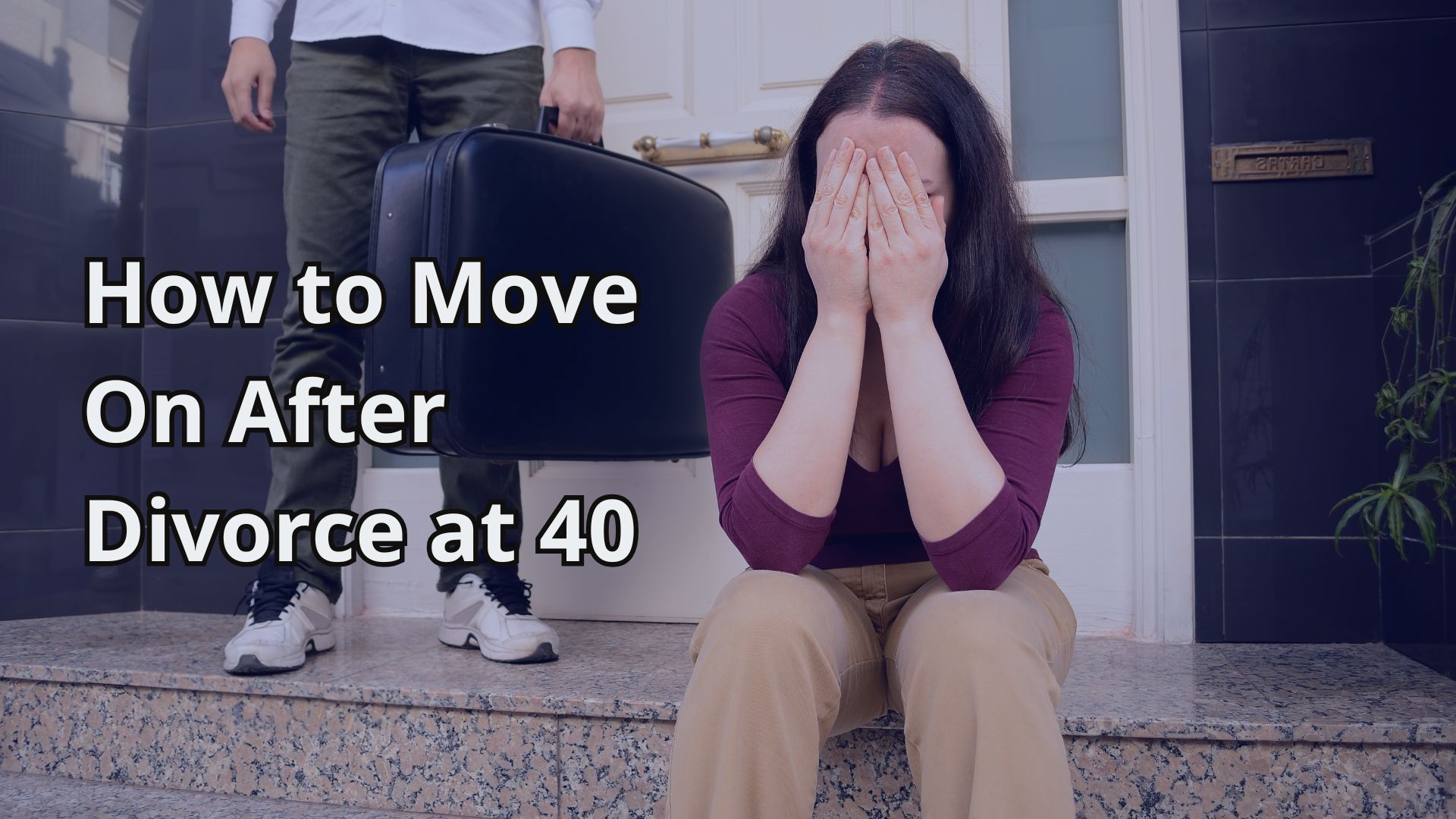Getting divorced at 40 can feel like your whole world just flipped upside down. One minute, you’re building a life with someone—maybe dreaming about vacations or growing old together—and the next, you’re staring at divorce papers, wondering, “How did I end up here?”
I’m Dr. Peggy Bolcoa, a psychotherapist who’s spent 23 years in Costa Mesa helping people pick up the pieces after heartbreak. Through Emotionally Focused Therapy (EFT) and stories from real clients, I’m here to share straightforward, no-nonsense steps to help you move forward, especially when it comes to relationships and jumping into online dating. No fluff, no big promises—just real advice to help you find your footing again. Ready? Let’s get started.
Divorce at 40 isn’t the end of your story—it’s the start of a smarter, stronger chapter.
Why Divorce at 40 Hits So Hard
Turning 40 is a big deal. You’re juggling kids, work, maybe a mortgage, all while wondering, “Is this really my life?” Then divorce comes along and flips everything upside down. It’s not just losing a partner—it’s like losing a piece of who you are, your confidence, and the future you pictured. Divorce rates for folks over 40 are up 14% since 2000, often because people feel emotionally disconnected or let down. In my therapy office in Costa Mesa, I see it all the time—clients come in feeling like their whole world’s fallen apart. And honestly? That’s a normal reaction when life throws you a curveball like this.
But here’s the flip side: 40 is a powerful age. You’ve got life experience, self-awareness, and a clearer sense of what you want. “Divorce at 40 isn’t a dead end; it’s a chance to pivot,” I tell my clients. With the right steps, you can turn this into a fresh start. Here’s how.
Step 1: Feel the Pain, But Don’t Let It Own You
Divorce is a loss, plain and simple. It’s not just losing a partner—it’s losing shared dreams, routines, maybe even your home. I hear clients say, “Peggy, it feels like someone died.” They’re not wrong. Grief is real, and you’ve got to face it to move forward.
- Let yourself feel it. Cry, scream into a pillow, or write it all down. A 2021 study in the Journal of Family Psychology found that people who process their emotions post-divorce recover 25% faster than those who stuff them down.
- Set a grief timeline. I tell clients, “Give yourself three to six months to feel the raw hurt, then start taking small steps.” This isn’t about rushing—it’s about not getting stuck.
- Reframe your story. Instead of “I failed,” try “I learned what doesn’t work for me.” One client, Sarah, 42, told me, “Once I stopped calling my divorce a failure, I felt like I could breathe again.”
In my work with EFT, I help clients process these feelings without drowning in them. It’s about honoring the pain, then choosing what comes next.
Step 2: Rediscover Who You Are
After years of being “we,” being “me” again can feel weird. You might’ve been “the spouse” or “the parent” for so long that you’ve forgotten what makes you, well, you. I’ve had clients in their 40s say, “Peggy, I don’t even know who I am anymore.” Let’s fix that.
Reconnect with Your Passions
- Pick up old hobbies. Did you love dancing, gardening, or playing guitar before marriage? Dust it off. Mark, 45, started surfing again after 15 years and said, “It reminded me I’m more than an ex-husband.”
- Try something new. Sign up for a pottery class, join a hiking group, or learn to cook Italian. Most people over 40 who tried a new activity felt more confident within six months.
- Set tiny goals. Run a 5K, read one book a month, or master a new recipe. Small wins build big confidence.
Rebuild Your Social Circle
Divorce can leave you lonely, especially if mutual friends take sides. Reach out to old buddies or make new ones. Lisa, 41, joined a local divorce support group and found people who got her. “I thought I’d be alone forever,” she said, “but those meetups gave me a tribe.”
Fix Your Self-Talk
Your inner voice can be brutal post-divorce. If you’re thinking, “I’m too old to start over,” stop. I have clients write three things they like about themselves every day. It sounds cheesy, but after 23 years, I’ve seen it work. Try it for a month—you’ll be surprised.
Step 3: Dip Your Toes Back into Dating
Dating after divorce at 40 can feel like stepping into a sci-fi movie—exciting but terrifying. Online dating dominates now, with 19% of adults over 50 trying it, per a 2023 Pew Research study. As someone who’s helped clients find love again, I’m here to make it less scary.
Are You Ready?
Don’t jump in too soon. A 2020 study in the Journal of Social and Personal Relationships found that waiting at least six months post-divorce leads to better relationships later. Ask yourself:
- Am I okay being alone?
- Am I dating to connect or to fill a hole?
- Can I talk about my divorce without anger?
If you’re hesitating, give it more time. “Date when you’re excited about new possibilities, not running from old pain,” I tell clients.
Tom, 43, met his fiancée on SofiaDate. “I was nervous about online dating,” he said, “but the questions helped me figure out what I really wanted.”
Set Smart Boundaries
Online dating can suck you in. Keep it manageable:
- Limit swiping to 30 minutes a day to avoid burnout.
- Always meet in public for the first few dates—coffee shops are perfect.
- Be clear about your goals. Want something casual? Say so. Looking for long-term? Own it.
Maria, 40, set a rule: no second date unless the first felt natural. She’s now engaged to a guy she met on LanaDate. “It was like a weight lifted when I stopped forcing things,” she said.
Spot Red Flags Early
You’re wiser now, but divorce can make you vulnerable. Watch for:
- Love-bombing (tons of affection right away).
- Wishy-washy communication.
- People who avoid talking about their past.
“Trust your instincts,” I tell clients. “If something feels off, it probably is.” One client ignored a guy’s hot-and-cold texts and ended up hurt. Don’t ignore the signs.
Step 4: Navigate Co-Parenting Like a Pro
If you’ve got kids, co-parenting is a big piece of moving on. It’s tricky, but I’ve helped tons of parents make it work over the years.
- Keep kids out of the drama. Never trash-talk your ex around them. A 2019 study in the Journal of Child Psychology and Psychiatry found that kids exposed to parental conflict post-divorce have 30% higher anxiety levels.
- Stick to a routine. Agree on schedules, rules, and holidays with your ex. David, 44, said, “A clear co-parenting plan gave me space to focus on dating and myself.”
- Get help if it’s tough. If you and your ex can’t talk without fighting, a therapist can mediate. I’ve used EFT to help exes communicate calmly, and it makes a huge difference.
If you’re struggling, check out CoParenting International for resources.
Step 5: Build Healthy New Relationships
Once you’re dating, focus on creating connections that last. My work with EFT shows that secure attachments—where both people feel safe and valued—are the foundation of good relationships.
Know Your Attachment Style
Understanding how you connect with others is huge. Here’s a quick breakdown:
- Secure: You’re comfortable with closeness and independence.
- Anxious: You crave reassurance and worry about being left.
- Avoidant: You pull back from closeness and prioritize independence.
In my practice, I help clients figure this out. Jane, 42, was anxious and kept picking avoidant partners. “Once I saw the pattern,” she said, “I chose someone who made me feel secure.” Learn more about attachment styles at ICEFT.com.
Be Honest About Your Needs
Clear communication is everything. If you want weekly date nights, say it. If you’re not ready for anything serious, be upfront. Honest communication boosts relationship success by 40%.
Go Slow
Don’t rush into big steps like moving in or blending families. Mike, 46, waited a year before introducing his new partner to his kids. “It gave us time to build something real,” he said. Patience pays off.

Online Dating Hacks for the Over-40 Crowd
Online dating can feel like a wild ride, but I’ve got tips from 23 years of helping clients:
- Use recent, honest photos. Skip filters or old pics. Authenticity draws the right people.
- Write a bio that’s you. Mention your hobbies and what you want. Emma, 41, wrote, “Love hiking and tacos—want someone to share both.” She got tons of messages.
- Don’t ghost. If you’re not interested, send a kind “no thanks” message. It’s respectful.
- Meet up soon. Don’t chat for weeks—aim for a coffee date within two weeks to avoid building false expectations.
A 2023 Pew study found that 71% of people over 40 who used dating apps found a serious relationship within a year. It takes time, but it works.
Avoid These Post-Divorce Traps
I’ve seen clients stumble after divorce. Here are pitfalls to dodge:
- Comparing new people to your ex. Nobody’s perfect, and comparisons kill new vibes.
- Jumping into commitment too fast. Wait at least a year to really know someone.
- Ignoring your kids’ feelings. If you’re dating, talk to your kids. Their sense of stability matters.
Rachel, 43, kept dating guys who reminded her of her ex. “I was chasing the same bad pattern,” she said. We used EFT to break that cycle, and she’s now happy with someone new.
Self-Care: The Secret Sauce
Moving on isn’t just about dating—it’s about taking care of you. Here’s what I tell clients:
- Exercise regularly. A 2025 study showed that 30 minutes of exercise three times a week cuts stress by 20%.
- Meditate or journal. Apps like Headspace or Calm can help. One client, Susan, 40, used journaling to process her divorce and said, “It was like therapy I could do at home.”
- Get enough sleep. Aim for 7–8 hours. Poor sleep makes everything harder. Try sleep meditations.
Real Stories from My Couch
Here are three stories from my practice that show moving on is possible:
- Laura, 40: Laura felt too old to date after her divorce. We worked on her confidence, and she tried SakuraDate. She met a guy who loves travel as much as she does. “Peggy, you said I’d find myself again, and I did,” she told me.
- James, 45: Co-parenting was a nightmare for James. Through therapy, he set boundaries with his ex and started using Bumble. He’s now in a solid relationship. “I didn’t think love was in the cards,” he said, “but I was wrong.”
- Claire, 41: Claire struggled with guilt over her divorce. We used EFT to process it, and she joined a local hiking group. She met her current partner there. “I never thought I’d feel this happy again,” she said.
When to Seek Professional Help
Sometimes, moving on feels impossible alone. If you’re stuck, therapy can help. In my practice, I use EFT to help clients process pain and build healthier relationships. Signs you might need help:
- You feel depressed or anxious for more than a few months.
- You can’t stop thinking about your ex.
- You’re scared to date or trust again.
Conclusion: Your Next Chapter Is Waiting
Divorce at 40 can feel like your world’s been turned upside down, like you’re lost and don’t know where to go next. But trust me, it’s not the end—it’s a fresh start in disguise. After 23 years as a psychotherapist, I’ve watched so many people take their heartbreak and turn it into something beautiful. “You’re not starting over from nothing,” I always tell my clients. “You’re starting with all the wisdom you’ve gained.” Take it one day at a time, give yourself some grace, and believe that love—whether it’s with someone new or just falling in love with yourself again—is waiting for you. You’ve got this.

